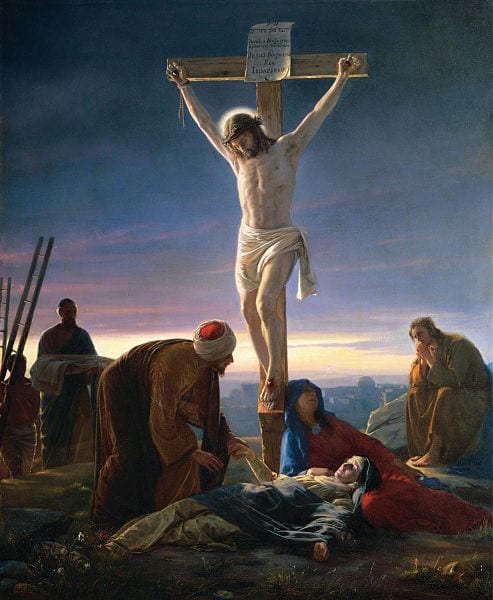
But God, by nature, is eternal and outside of time, so in His Divine Nature, the crucifixion is timeless and ongoing. That’s why we can speak of His death as both historical and ongoing, and how the Sacrifice of the Mass can occur now as a present reality. And it is why, after His resurrection and ascension, the apostle John could still refer to Him as follows:
Revelation 5:6 (RSV) And between the throne and the four living creatures and among the elders, I saw a Lamb standing, as though it had been slain, . . .
Many Protestants (particularly Calvinists) appear to minimize the Divine Nature element of the crucifixion, and so they deny that Jesus could be present at the Mass because now He is up in heaven. This is almost akin to the ancient heresy of Nestorianism (that separated the two natures of Jesus too greatly; almost making Him two persons).
Well, if we ignore the fact that He is also God as well as man, we come up with that, but for a God Who is omnipotent, omnipresent, and beyond time (and Jesus is God and has all those qualities in His Divine Nature), the miracle of the Sacrifice of the Mass is entirely plausible, possible, and biblically sanctioned. The following passage seems to suggest a sort of transcendence of time in this regard:
1 Peter 1:18-20 You know that you were ransomed from the futile ways inherited from your fathers, not with perishable things such as silver or gold, [19] but with the precious blood of Christ, like that of a lamb without blemish or spot. [20] He was destined before the foundation of the world but was made manifest at the end of the times for your sake.
What God decrees or ordains or predestines, He does from all eternity (outside of time altogether). All Christians are pretty much agreed on that. Therefore, the crucifixion (an event ordained from eternity and directed towards the God-Man Who willingly sacrificed Himself), has the same characteristics. It has a timeless element, as both a decree from God (the Father) and an act of God (the Son). God died on the cross. Hence the following passage (again, appropriately, from St. Peter, the first pope), where we clearly observe the intersection of God’s timeless plan and foreordination, and human history and actions:
Acts 2:23 this Jesus, delivered up according to the definite plan and foreknowledge of God, you crucified and killed by the hands of lawless men.
I believe this thought is orthodox, with nothing objectionable. But I’m sure it’s not new. Everything in Catholicism has always been thought of before by someone.
***
Related Reading
Sacrifice of the Mass & Hebrews 8 (vs. James White) [3-31-04]
Sacrifice of the Mass and NT Altars (vs. Calvin #49) [12-9-09]
Mass: Re-Sacrifice? (vs. Lutheran Pastor Ken Howes) [4-2-12]
Catholic Mass: “Re-Sacrifice” of Jesus? [11-19-15]
Was the Apostle Paul a Priest? [National Catholic Register, 4-2-17]
Is Jesus “Re-Sacrificed” at Every Mass? [National Catholic Register, 8-19-17]
Why is Melchizedek So Important? [National Catholic Register, 1-15-18]
“Re-Presentation” vs. “Re-Sacrifice” in the Mass: Doctrinal History [4-4-18]
Time-Transcending Mass and the Hebrew “Remember” [National Catholic Register, 8-3-18]
***
(originally posted on 9-25-09)
Photo credit: Christ on the Cross (1870), by Carl Heinrich Bloch (1834-1890) [public domain / Wikimedia Commons]
***












